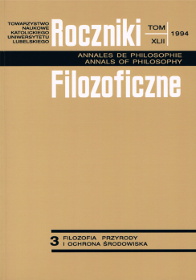Logika indukcji a statystyka matematyczna
Abstrakt
The early concepts of the inductive logic have origin by ancient and medieval thinkers, but the true development we observe just in the second half of XIX century when the probability theory was applied there. In the XX century a real explosion of papers in this area is observed, but generally this literature is based on the subjective probabilities concepts. It is observed also an unpleasant gap between this direction and the excellent development of mathematical statistics which is very efficient technically, but the philosophical foundations of this apparatus were loitering downwards. It seems to be an misunderstanding that some controversies between statisticians caused a small statistical experience by the authors of inductive logic and vice versa − the methodology of mathematical statistics was not supported by the philosophical thought.
Bibliografia
Agassi J., Positive Evidence in Science and Technology „Philosophy of Science”, 37(1970), No 2.
Barra J. R., Matematyczne podstawy statystyki, Warszawa: PWN 1982.
Blackwell D., Girshick M. A., Theory of Games and Statistical Decisions, New York: John Wiley 1954.
Box G., Tiao G. C., Bayesian Inference in Statistical Analysis, Reading, Mass. − Menlo Park, Cal. − London − Don Mills, Ont.: Addison-Wesley Publishing Company 1973.
Brillouin L., Science and Information Theory, Academic Press Inc. (USA) 1963.
Fisz M., Rachunek prawdopodobieństwa i statystyka matematyczna, Warszawa: PWN 1958.
Grzegorczyk A., Zarys logiki matematycznej, Warszawa: PWN 1975, BM 20.
Hajduk Z., O akceptacji teorii empirycznej, Lublin: RW KUL 1984.
Hume D., Traktat o naturze ludzkiej, Warszawa: PWN 1977 (I wyd. XVIII w.).
Kyburg H. E., Probability and the Logic of Rational Belief, Middletown: Weleyan University Press 1961.
Kyburg H. E., Probability and Inductive Logic, London: McMillan 1970.
Kyburg H. E., Local and Global Induction, w: Local Induction, red. Bogdan, Dordrecht 1976.
Levi I., Gambling with the Truth, Borzoi Books in the Philosophy of Science, Columbia University Press 1967.
Levi I., The Enterprice of Knowledge, Cambridge: The MIT Press 1980.
Luce R. D., Raiffa H., Games and Decisions, New York: John Wiley and Sons 1957.
Mikiewicz J., Statistical Selection Method of the Best Obiects, w: 1974 European Meeting of Statisticians. Transactions of the Conference, Vol. A Prague: ČAV UTIA 1977, s. 369-377.
Mikiewicz J., Podstawy statystycznej metody decyzyjnej wyboru najlepszych obiektów, „Prace Naukoznawcze i Prognostyczne”, 1987, nr 1-2 (54-55) s. 117-129.
Mikiewicz J., Zastosowanie statystycznej metody wyboru najlepszych obiektów w chemii, Wrocław 1990, Prace Naukowe Ośrodka Badań Prognostycznych Politechniki Wrocławskiej, nr 24, Studia i Materiały, nr 6, s. 169-182.
Mortimer H., Logika indukcji. Wybrane problemy, Warszawa: PWN 1982.
Mostowski A., Logika matematyczna, Warszawa−Wrocław: PWN 1948, Monografie matematyczne, t. XVIII.
Nauta D., Jr., The Meaning of Information, Mouton 1972.
Neyman J., Pearson E. S., On the problem of the most efficient tests of statistical hypotheses, w: Philosophical Transactions of Royal Society, London, ser. A, 231 1933, s. 289.
Popper K., Logika odkrycia naukowego, Warszawa: PWN 1977.
Rényi A., Probability Theory, Budapest: Akadémiai Kiadó 1970.
Savage L. J., Foundations of Statistics, New York: John Wiley 1954.
Savage L. J., The Foundations of Statistics Reconsidered, w: Proceedings of the IVBerkeley Symposium on Mathematical Statistics and Probability 1960, wyd. University of Berkeley (Cal.) 1961.
Savage L. J., Foundations of Statistical Inference, w: Joint Statistical Seminar, University of London (England) 1962.
Szaniawski K., Two Concepts of Information, „Theory and Decision” 5(1974).
Szaniawski K., Types of Information, w: Formal Methods in the Methodology of Empirical Sciences, Transactions of the Conference, Wrocław 1976, s. 297-308.
Wald A., Statistical Decision Functions, New York: John Wiley 1950.
Wójcicki R., Metodologia formalna nauk empirycznych, Warszawa: PAN 1974.
Zabierowski M., O pewnym programie badawczym w kosmologii i kosmogonii, w: Z zagadnień filozofii przyrodoznawstwa, Warszawa: Akademia Teologii Katolickiej 1985.
Copyright (c) 1994 Roczniki Filozoficzne

Utwór dostępny jest na licencji Creative Commons Uznanie autorstwa – Użycie niekomercyjne – Bez utworów zależnych 4.0 Międzynarodowe.





